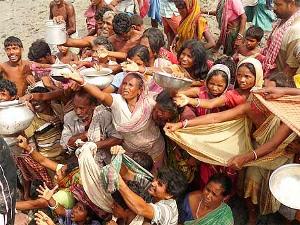 | « Back to article | Print this article |
 The Planning Commission is interacting with grassroot-level health workers to invite specific suggestions and incorporate the same in policies to tackle malnutrition in India.
The Planning Commission is interacting with grassroot-level health workers to invite specific suggestions and incorporate the same in policies to tackle malnutrition in India.
"We held a meeting with officials of the ministries concerned, ASHA (accredited social health activists) and anganwadi workers.
"We are interacting with them and listening to the problems they were facing while working at the ground level," Planning Commission member Arun Maira told reporters on the sidelines of a seminar.
He said the suggestions evolving out of the deliberations can be 'adjusted in the existing policies or in a new policy as required' to better tackle the problem of malnutrition which the prime minister has called a 'national shame'.
Maira felt only declaring food security as a right will not solve the problem and 'we will have to deliver it to people. The Commission will have to focus on implementation.'
He also spoke about particular intervention targeting teenage girls to improve the situation.
The seminar on 'India's Malnutrition: Combating the Hard Core' organised by Britannia Nutrition Foundation saw a number of experts on nutrition speaking on the issues related to the state of malnourishment in India.
Foundation chairperson Vinita Bali spoke of an action plan to combat the problem bringing public, private and NGO sector together.
Director of UK's Institute of Development Studies Lawrence Haddad focused on new approaches including nutrition surveillance and monitoring nutrition commitments.
Nobel laureate economist Robert Fogel also addressed the symposium via video-link. Over 40 per cent of the world's underweight children below five years live in India. About 55 per cent of pre-school children are underweight and 50 per cent suffer from stunted growth.